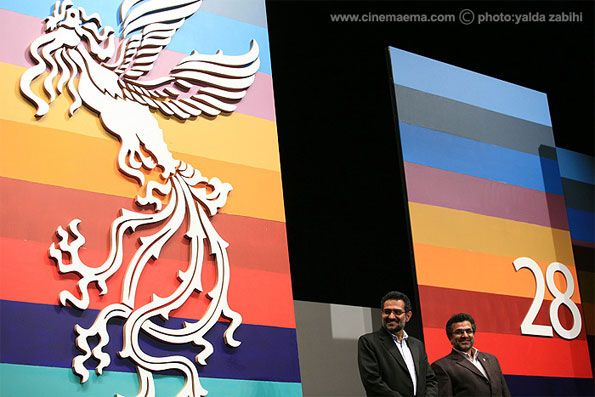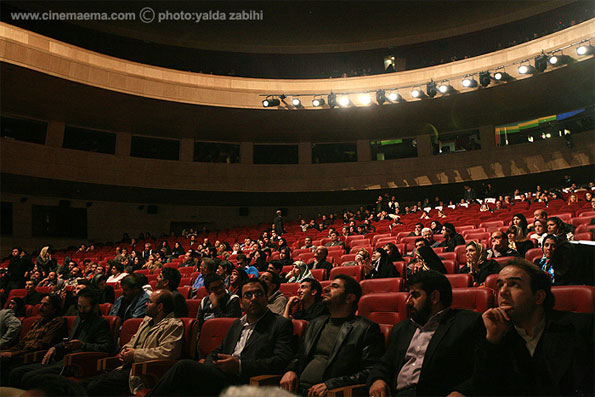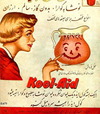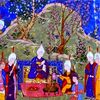Will the Fajr boycott work?
by GOLAB P. in Tehran
25 Jan 2010 19:477 Comments


 [ dispatch ] The annual Fajr Film Festival is the biggest cinematic event of the year. It was established two years after the 1979 Iranian Revolution. The festival is sponsored by the Ministry of Culture and Islamic Guidance and the Farabi Film Foundation, and usually held during the 10 days of Fajr in February commemorating the victory of the revolution. As of 1994, the festival has become international in scope, at times attracting acclaimed screenwriters and filmmakers from across the globe.
[ dispatch ] The annual Fajr Film Festival is the biggest cinematic event of the year. It was established two years after the 1979 Iranian Revolution. The festival is sponsored by the Ministry of Culture and Islamic Guidance and the Farabi Film Foundation, and usually held during the 10 days of Fajr in February commemorating the victory of the revolution. As of 1994, the festival has become international in scope, at times attracting acclaimed screenwriters and filmmakers from across the globe.
Each year, movie lovers here seek out the schedule with great excitement and prepare to queue up in a line that can stretch for miles (photos here are from the Palestine Cinema in Tehran in 2007). Even though the festival is held in the dead of winter, the brutal weather has never dampened enthusiasm. Neither has other obstacles. For example, at least once every year, one much-anticipated movie is banned just prior to screening. Tickets were sold out for Ali Santoori in 2007. But renowned Iranian director Dariush Mehrjui's film was banned the day before it was scheduled to be screened. Ebrahim Hatamikiya's The Color Purple met a similar fate.
Boycott or not?
Things may be a bit different this year. In cultural circles everywhere, you hear the same refrain: boycott or not? So far, a number of notable Iranian actors and directors have declined to join the judge's panel, citing other commitments but not openly acknowledging the boycott: Asghar Farhadi (director, About Elly) announced that he would be in Serbia to participate in a film festival there; Ezatollah Entezami (actor) said that he would be unable to participate due to illness; Fatemeh Goodarzi (actress) first announced that she would be unable to join due to travel commitments, but later accepted to serve as a judge; Abbas Kiarostami (director) never publicly declared why he declined the offer to judge this year; and Minoo Farshchi (writer) also bowed out.
In an interview with Chelcheragh magazine, Dariush Mehrjui was asked if he would be willing to serve as a judge this year. "Of course not!" he was quoted as saying. "I served as a judge years before, when things were better. A festival that is as poorly done as this one needs judges to match. Really, this festival is so awful that we should not even waste our time speaking about it."
He was asked whether boycotting the festival might harm the movie industry and artists. "The festival has nothing to do with the work of these artists," he replied. "These artists and cinematographers will do their own work and make their own movies." The reporter followed up by asking, "What then is the purpose of the festival?" "Nothing," Mehrjui said. "A group of people will gather in a room and applaud themselves and give themselves prizes."
The boycott campaign, which has its own Facebook page with nearly 6000 members, is administered by students in Iran but includes members from all over the world. They feature a letter by Ken Loach, the acclaimed British director, who has also refused to participate. According to the Independent newspaper, "Ken Loach and the British theatre director Peter Brook are among leading Western artistic figures who have informed the Islamic regime they are pulling out in protest at its brutal crackdown on the opposition, which includes torture, prison rapes, countless killings and Stalinist-style televised show trials of reformists." Other important foreign no-shows were noted by an Los Angeles Times blog.
The list of artists who declined to participate grew so rapidly that up until the day of the festival, the organizers withheld the list of judges. In a statement posted on the festival's official Web site, officials said that the list "would remain a secret."
Opportunity knocks
Despite some early successes, this boycott campaign may be ineffective because some artists were faced with an opportunity they didn't want to pass up. Ebrahim Hatamikiya (pictured to the right), a leading director and writer popular for his depictions of the Iran-Iraq war, announced his decision to participate in Fajr this year after his movie, The Color Purple, which has been banned for five years, obtained a permit to be shown at the upcoming festival. Much to the dismay of those calling for a boycott, Hatamikiya followed through and appeared at theopening ceremonies on Saturday (more photos here, here, and here). Writer and director Ghotbeddin Sadeqi, director Shahram Asadi, actress Ladan Mostofi and actor Dariush Arjmand were also among those present as well. Even so, the number of big names present had considerably diminished this year.
In the view of other artists attending, including a director with whom I spoke yesterday (she has asked to remain anonymous), this was an opportunity. As a director who has only been working for the last five years, she believes this applies to other younger writers, directors and artists like herself, who lack the stature of their elders.
Since the Ministry of Culture (the government) is the ultimate arbiter of their work, she said a boycott would only serve to limit their activities even more than it already is. "If the ban on the work of these artists is lifted in order to woo audiences and artists to the festival, why not use this opportunity?" she asked. "What use will it be to artists in the long run if they add to the limitations imposed on them by the government?"
Copyright © 2009 Tehran Bureau






























7 Comments
"The reporter followed up by asking, "What then is the purpose of the festival?" "Nothing," Mehrjui said. "A group of people will gather in a room and applaud themselves and give themselves prizes.""
- This is the funniest thing I have read in a while!
Pak / January 26, 2010 10:27 AM"If the ban on the work of these artists is lifted in order to woo audiences and artists to the festival, why not use this opportunity?" I don't want to rush into a judgment, but one could easily reply that some students have been risking their academic career by protesting and by not taking their exams. If they can make such a huge risk, why can't these young directors?
Sepand / January 27, 2010 10:53 AMSepand, "a huge risk" to achieve what?
Golab P. / January 27, 2010 8:09 PMI was there with the students at one particular university, and it was much less romantic than it is far afar. A small group of students were literally bullying everyone and not letting them attend class.
And what did it achieve? Those very students, were those with the highest grades in their year and missing class did not influence their grade at all. They took their exams, they finished off top of the class, and moved on. In fact, a number of them have scholarships from U.S. and Europe and are leaving Iran by August.
If Hatamikiya and these opportunistic artists are getting a break this year, it's because thousands of people (students and others) have sacrificed life and limb and put the state under tremendous pressure. The government is showing leniency in some areas mainly because of that. I wonder how these "artists and filmmakers" can go to bed at night knowing how many got tortured, beaten, raped and even killed for them to have "an opportunity." Shame on them.
Anonymous / January 28, 2010 1:50 AMAnonymous, I would be careful before making such sweeping statements. Being a filmmaker in Iran is one of the hardest jobs in the world, and the likes of Hatamikiya, Sadeqi and Asadi have withstood years of harassment and manipulation of their work and yet remained in Iran, making films for and about Iranians. They have received, made and lost opportunities like this one long before June 09 and the death, beating and killing of protesters.
"The government is showing leniency in some areas mainly because of that." No, the government shows leniency come it every Farj season, every year a movie is given a permit and another is banned. This year is no exception. Mehrjui's Banoo was banned for seven years before it got a screening. I should have also noted in the article that many of the big names that refused to participate had no work to exhibit this year. So there's no telling what they would have done had they had a movie lined up. Hatamikiya did have a movie, but he refused to participate in the premier or the press conference.
Shame on anyone who condemns and brutally sweeps aside others without regard for their condition or their circumstances.
Golab P. / January 28, 2010 2:52 AMGolab, not all students went down the same fortunate path. I personally know a lot of students who now can't go back to university.
Sepand / January 28, 2010 7:37 AMSo do I Sepand. I was just talking about canceling classes, to which I thought you were referring to as well.
Golab P. / January 28, 2010 9:06 AM